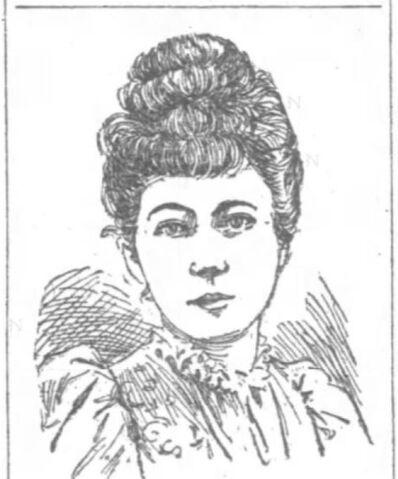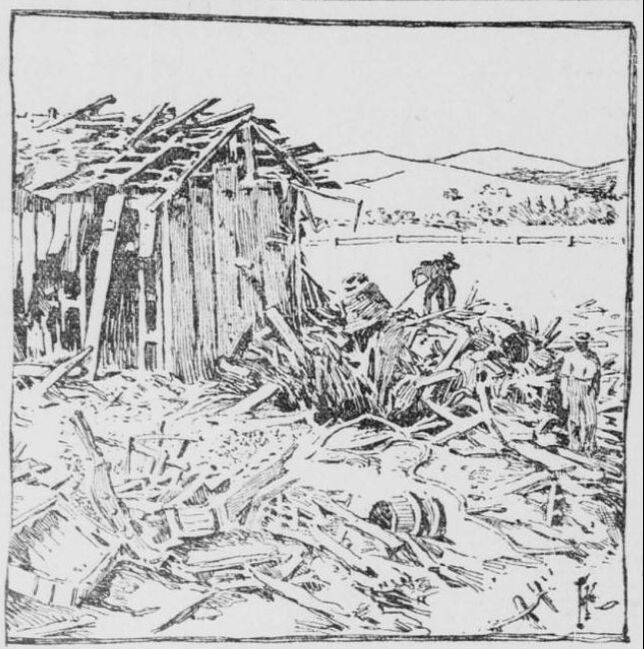 Richard T. Board’s intake photo (top) and discharge photo (bottom) from San Quentin Prison. His offense is listed as “felony”—probably a clerical error since he was convicted of forgery. Richard T. Board’s intake photo (top) and discharge photo (bottom) from San Quentin Prison. His offense is listed as “felony”—probably a clerical error since he was convicted of forgery. This is the second in a series of blog posts about my great-great uncle Richard T. Board, the uncle of my already infamous grandfather William Lyons Board. (Read Part 1) Many thanks again to my friend Tessa Bishop Hoggard for discovering yet another curiously dissipated ancestor of mine. It is only because of her extensive research that I am able to share these startling stories with you. Nine years after being released from federal prison in Illinois, where he served two years for stealing a $163 money order from a mail service train on its way to Santa Fe, N.M., Richard T. Board Jr. sits next to his attorneys in another courtroom, this time in Alameda County, Calif., with a baby in his arms. It’s August 1897. During the trial, he does not deny that he endorsed a $50 check with his kindly benefactor’s name—a woman who had provided him shelter on her ranch when he was destitute—and then asked a 15-year-old boy he approached in the street to have it cashed at Kahn Brothers shoe store. But he claims that he was driven to this criminal act only by the dire circumstances of his poverty. After losing his job at Judson Iron Works, he had been struggling to find work and was searching for a way to feed his family, including his wife, there in the courtroom anxiously watching the proceedings, and the baby he continues to hold. He also makes a point to mention that he and his wife, Mary, had recently lost another child. How had Board gotten into this predicament? After being discharged from the Army in July 1894, he had remained in the San Francisco area and married Mary Hannah Beadle in December. He may have done a brief stint in the Marine Corps, serving at the Navy Yard on nearby Mare Island. It’s more certain that he joined the National Guard in April 1896 and was honorably discharged in September. Now in his mid-30s, these enlistments may well have been his best shot at a steady paycheck. The U.S. military services were evidently happy to accept a convicted felon in their ranks. But now he finds himself in yet another courtroom facing yet another term in prison. Newspapers across the country are covering this trial, just as they did his first. Board is repeatedly identified as “a protégé of ex-Senator Joe Blackburn of Kentucky [whose] father was for thirty years clerk of the United States circuit court of Kentucky.” [The Omaha Evening Bee, 04 July 1897] No newspaper mentions the younger Board’s multiple arrests for forgery or theft. None mentions his previous incarceration. Board tells them exactly what he wants them to print, which is whatever he thinks will help his case. In the end, the judge—clearly affected by the pathos of the situation before him—gives Board the minimum sentence for his offense. Board is sent to San Quentin for one year. Is it possible that the judge was not aware that Oakland police had a warrant for Board’s arrest a year earlier for similar crimes: sending boys into butcher shops and breweries to cash checks and thus defraud the proprietors? According to the San Francisco Call, a string of these crimes had again been reported in the weeks leading up to Board’s arrest in June. His forgery of the check in the shoe store was not an isolated crime committed in a moment of desperation. Nevertheless, it’s almost certain that the judge was aware of who Mary Beadle Board was. Just as it’s almost certain that Richard Board knew who Mary Beadle was long before he ever left St. Louis for his Army stint in San Francisco. Was it mere happenstance that he landed in the very city where one of the nation’s most sensational trials was taking place? Or did Richard Board arrive in California with designs on the aspiring teenage heiress Florence Blythe or her nurse, Mary Beadle? Let’s jump back a bit and pick up Mary’s story.  Heiress Florence Blythe Hinckley, from the San Francisco Chronicle, 01 December 1892. Heiress Florence Blythe Hinckley, from the San Francisco Chronicle, 01 December 1892. On April 4, 1883, real estate tycoon Thomas Henry Blythe died suddenly at his home in San Francisco at age 60. A native Englishman of some reserve and mystery, he had amassed a $4 million fortune and owned vast property in San Francisco, San Diego, and Mexico, as well as a mining property in Nevada. Upon his death, more than 100 women came forward claiming to be his widow or his heir. Ten-year-old Florence Blythe, whose family asserted she was Blythe’s illegitimate daughter and sole legitimate heir, was brought to California from her home in England shortly after her father’s death by her maternal grandfather, Mr. James Crisp Perry, his wife, Kate Beadle Perry, age 30, and her sister, Mary Beadle, age 24. Mrs. Kate Perry was frequently identified in the press as Miss Blythe’s “guardian” and Mary Beadle as her “nurse” or as a servant in the Perry household. Initially, no will could be found, and the courts wrestled with Blythe’s estate until the matter was sent to trial, six years after his death, on July 15, 1889. A verdict would not be reached in the complicated case until 1895. Five days after the trial began, one of the attorneys for Florence Blythe announced that he had located Mr. Blythe’s missing will in Los Angeles, where it had been stashed by Mr. Blythe’s housekeeper, who claimed after his death to be his widow. The will bequeathed the entire estate to his young daughter, Florence Blythe. The attorney also had letters written by Mr. Blythe to his daughter and his daughter’s mother, many which had contained money for her support. The almost cartoonish melodrama of the trial was breathlessly covered by newspapers across the country, including in St. Louis, where Richard Board could follow the lurid details in the Globe-Democrat after he got out of prison. He likely was familiar with all the major players, including Mary Beadle, who with her older sister and brother John were put on the stand to testify about their history with their young charge, Florence Blythe, when they all lived in England. When Richard Board lands in San Francisco for a stint in the Army in April 1892, he may have had designs on the young heiress herself. But on June 22, 1892, 19-year-old Florence Blythe surprises her loyal followers by marrying the boyish Fritz Hinckley, 23, heir to his father’s foundry business. (Fritz dies tragically five years later after suffering appendicitis while traveling with friends to Salt Lake City.) So perhaps Richard then sets his sights on Mary, who expects to receive a sizable sum ($10,000-$15,000) for her services working for the Perry family once the estate is settled. And on December 3, 1894, Richard marries her. But things don’t go as planned for the newlyweds. Florence Blythe Hinckley disapproves of the marriage (because Board had made overtures to her?) and casts Mary aside. Florence’s grandfather, James Crisp Perry, dies and his wife Kate, Mary’s sister, remarries. The Boards find themselves abandoned by Mary’s family and penniless. Before her husband’s trial begins, Mary announces she intends to sue the Blythe Hinckley estate and her sister for the money she feels she is due. A few months after Board’s trial, while Richard remains incarcerated in San Quentin, Mary’s sister Kate, now Mrs. John E. Byrne, receives $250,000 from the heiress. From all we know, Mary patiently waits for her husband’s return from San Quentin. Three months after his homecoming, Richard Board is working in the nitrate house at Judson Dynamite and Powder Works in Berkeley when there is an explosion in the adjoining mixing room. The building is destroyed and the two men who had been in the mixing room are “blown to atoms.” [Evening Sentinel, Santa Cruz, Calif., 24 October 1898] Board is thrown 60 feet but receives only lacerations. Only a wooden bulkhead had separated him from the 200 pounds of gelatin (guncotton, nitroglycerine, potassium nitrate, and other ingredients) that was being made into dynamite next door. Board described his experience to a reporter from the San Francisco Call’s Oakland office: “A little after 8 o’clock the explosion occurred, but it came so suddenly that I hardly heard anything. In fact I did not have time to think before I was in the air, with lumber and dirt flying all about me….I cannot describe the sensation…for it was most peculiar. First I seemed to be falling into a deep abyss, then the walls seemed to all cave in and I was drawn right up into space.” After yet another encounter with fickle fate, Richard T. Board Jr. walks away nearly unscathed. Soon his remarkable luck will protect him once again, while tragedy befalls all those around him.
3 Comments
Sharon Hawkins
4/19/2022 09:40:17 am
Family history is always fascinating to me. Thanks for sharing
Reply
Barbara R Fallis
4/19/2022 06:44:11 pm
The Board men...you start peeling that onion and it never seems to end. Keep the stories coming, Sallie!
Reply
Jacob
11/10/2022 10:04:49 am
Thomas Henry Blythe wasn’t an Englishman you can’t be an English man of some reserve and mystery if you aren’t an Englishman he was born in Wales and spent his early years in Wales prior to emigrating to the United States making him unequivocally Welsh.
Reply
Your comment will be posted after it is approved.
Leave a Reply. |
Details
Archives
June 2023
Categories
All
|



 RSS Feed
RSS Feed